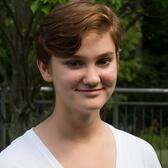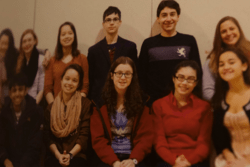The Nerd Herd
If there’s one thing that characterized my formal Jewish education, it would have to be my profound dislike of it. Though I’ve always felt deeply connected to my Judaism, both culturally and religiously, organized religious school was extremely difficult for me. From about third grade onwards, I found that my peers’ interest in the subject at hand, whether that was interpretations of God or the story of Passover, was halfhearted at best and nonexistent at worst. By and large, I found that they were more interested in watching the clock or seeing how far back they could tip in their chairs. And since I’m someone who likes to get knee-deep in whatever I’m studying, this was a two-pronged problem for me-- it was frustrating to learn in such an environment, and being a proud nerd in a roomful of reluctant students was a terrible way to make friends. It was the ultimate paradox: I dreaded religious school because I liked it!
In the fall of my freshman year, my parents received an email from our head rabbi, notifying them of a new program that my synagogue was piloting. It was Beit Midrash, literally “house of learning” in Hebrew: a more in-depth text-study program with a focus on Pirkei Avot (a compilation of the ethical teachings of the Rabbis of the Mishnaic period) for 7th-9th graders. Naturally, I signed up. I was one of two freshmen that year, sharing the space with several 7th and 8th graders. We had never met before; our only commonalities were that we attended the same shul and were all interested in a more rigorous religious school experience. By attending Beit Midrash, we had all made the choice to separate ourselves from the rest of the pre-confirmation program to try out a new path of learning, which perhaps wasn’t the most socially acceptable one for us to take. Voluntarily learning for the sake of knowledge has never exactly been a form of social capital in the teenage years, and signing up for an intensive text study was no exception to this. Yet, there we were-- awkward, a little self-conscious, and ready to learn.
In short? It was awesome. This was my first time in an intentional, entirely voluntary community of scholars (and Jewish scholars, no less!), and I found that such an atmosphere fit me like a glove. Admittedly, it was made up almost entirely of young teenagers, which gave it a frenetic, somewhat haphazard quality. We almost careened from one idea to the next, and more than occasionally down some ridiculous tangential paths. We developed inside jokes, and named our decidedly nerdy crew “The Manhattan Project,” because we disappeared from sight to discuss very secret, obscure things, and managed to learn quite a bit about the topics at hand along the way.
It wasn’t that rebellious of a thing to do, joining a study group in order to comfortably talk about things that interested me. But forging my own educational path in an institution-- and social order-- that had a certain way of doing and thinking about things was still a quietly nonconformist, subversive act. As the first group of Beit Midrash Scholars, it was our job to set a precedent for the way the class’s structure would be in the future, to establish a standard for student-clergy relationships, and to begin our own individual scholarly journeys. Though we had all consciously exited the larger religious education program at my synagogue, that had only been the beginning. We left and started from scratch, and though the impact wasn’t so obvious to those outside the group, the effect was profound for us.
Ironically, I left Beit Midrash after its first year, having aged out into the regular confirmation program. I wasn’t thrilled about leaving the little scholarly enclave we had built, but I found that the wackier side of me that had been such an asset in Beit Midrash served a similar purpose in discussions with my peers in Confirmation. My year in Beit Midrash also taught me that my curiosity and I absolutely had a place in my religious school-- I had just needed to find it.
This piece was written as part of JWA’s Rising Voices Fellowship.







